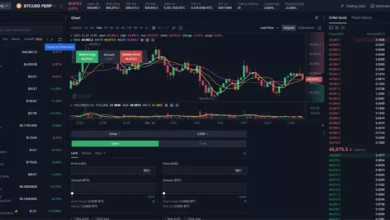Cryptocurrencies Have Failed the Test of Digital Money,’ MAS’ Managing Director Says
Singapore's Vision: More Than Cryptocurrencies Speculation

**Introduction: The Evolution of Digital Money**
The landscape of Cryptocurrencies has evolved over the past decade, with various contenders vying for the title of the future of money. Ravi Menon, the managing director of the Monetary Authority of Singapore (MAS), recently weighed in on this ongoing debate during his keynote address at the Singapore Fintech Festival.
**The Four Contenders for Digital Money**
In his speech, Menon identified four key contenders for digital money: privately issued cryptocurrencies, central bank digital currencies (CBDCs), tokenized bank liabilities, and well-regulated stablecoins. Each of these plays a distinct role in the financial ecosystem, and Menon offered his insights into their strengths and weaknesses.
https://vdbaa.com/fullpage.php?section=General&pub=971445&ga=g

**Cryptocurrencies: A Failed Test**
Menon’s perspective on cryptocurrencies is clear: they have failed the test of digital money. According to him, cryptocurrencies have struggled as a medium of exchange or store of value. Their volatile prices and the significant losses incurred by investors have raised questions about their reliability in the financial market.
**The Rise of Stablecoins and CBDCs**
Contrary to the uncertain fate of cryptocurrencies, Menon expressed optimism about stablecoins and CBDCs. He sees them as integral components of the future financial landscape. Well-regulated stablecoins, in particular, have captured his attention as promising digital currency options. StraitsX’s stablecoin and Paxos Digital’s USD-pegged stablecoin were highlighted as exemplary models.
**Singapore’s Vision: More Than Crypto Speculation**
Despite Singapore's reputation as a crypto hub, Menon emphasized the nation's desire to be known as a digital assets hub. He elaborated on the broader applications of blockchain technology beyond crypto speculation. Project Guardian, led by MAS and industry partners, exemplifies this vision by tokenizing foreign exchange, bonds, and funds to enhance global liquidity and streamline financial transactions.
**A Network of Interoperable Systems**
Menon envisions a larger network of interoperable systems that facilitate instantaneous and seamless payment, clearing, and settlement. He highlighted the transformative potential of digital assets, citing two critical features that could fundamentally change the nature of financial transactions.
**The Global Layer One (GL1) Initiative**
Addressing the challenges faced by existing digital asset networks, MAS is launching the Global Layer One (GL1) initiative. Menon described GL1 as a global public good designed to enable seamless cross-border transactions and the trading of tokenized assets across global liquidity pools while adhering to regulatory requirements.
**FinTech with a Larger Purpose**
Menon emphasized that FinTech, including digital assets and digital money, should have a larger purpose. The GL1 initiative aligns with Singapore's commitment to ensuring that FinTech solutions address real-world problems and contribute to improving people's lives.
**Conclusion: Realizing the Vision of Seamless Financial Transactions**
In conclusion, Menon reiterated that the combination of digital assets, digital money, and a foundational digital infrastructure can pave the way for seamless financial transactions globally. Singapore's commitment to innovation and regulatory excellence positions it as a leader in shaping the future of the financial industry.
# **Frequently Asked Questions (FAQs)**
1. **What are the main reasons behind Ravi Menon’s belief that cryptocurrencies have failed as digital money?**
– Menon points to the poor performance of cryptocurrencies as a medium of exchange or store of value, their volatile prices, and significant losses suffered by investors.
2. **Why does MAS view well-regulated stablecoins favorably?**
– Well-regulated stablecoins are seen as promising digital currency options due to their stability and adherence to regulatory standards, making them more reliable in the financial market.
3. **What is Project Guardian, and how does it contribute to Singapore’s vision of being a digital assets hub?**
– Project Guardian, led by MAS and industry partners, focuses on tokenizing foreign exchange, bonds, and funds to enhance global liquidity, streamline cross-border transactions, and improve operational efficiency in financial markets.
4. **What challenges do existing digital asset networks face, according to Ravi Menon?**
– Existing digital asset networks, including public permissionless blockchains and private permissioned blockchains, face challenges such as lack of accountability, legal uncertainty, and interoperability issues.
5. **How does the Global Layer One (GL1) initiative aim to address challenges in existing digital asset networks?**
– GL1 is conceived as a global public good, aiming to facilitate seamless cross-border transactions and enable the trading of tokenized assets across global liquidity pools while meeting relevant regulatory requirements.




